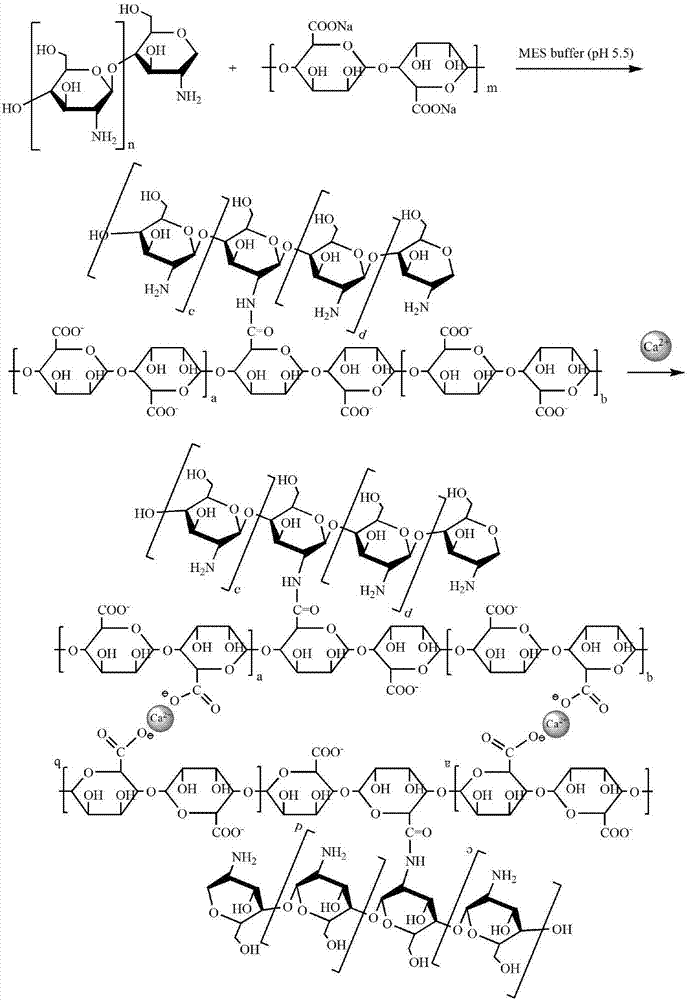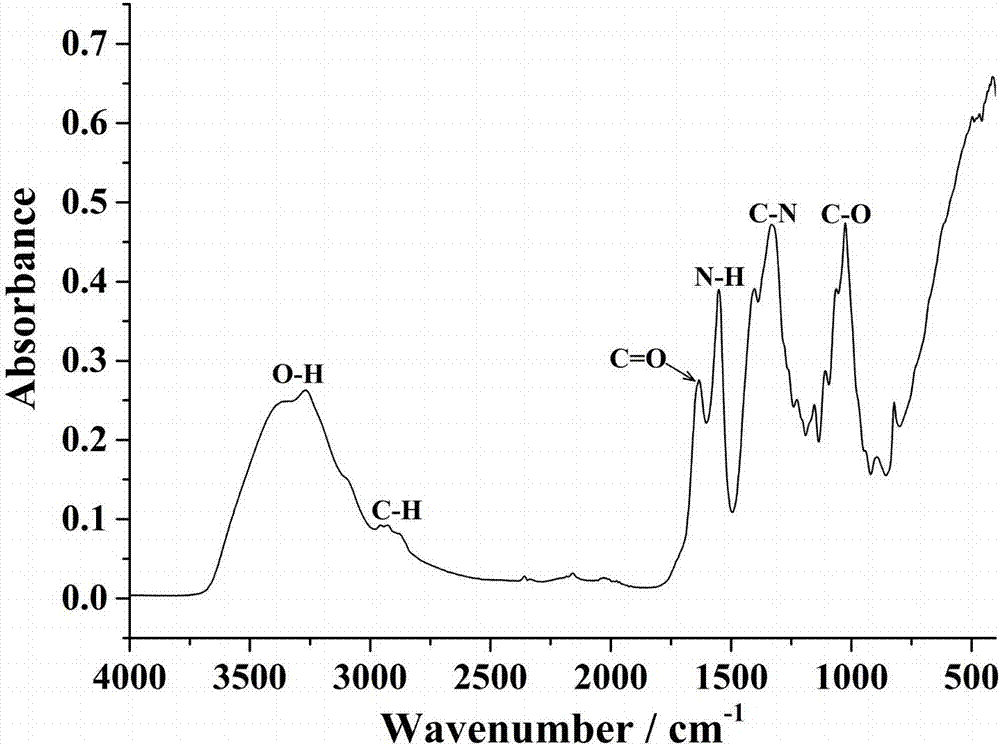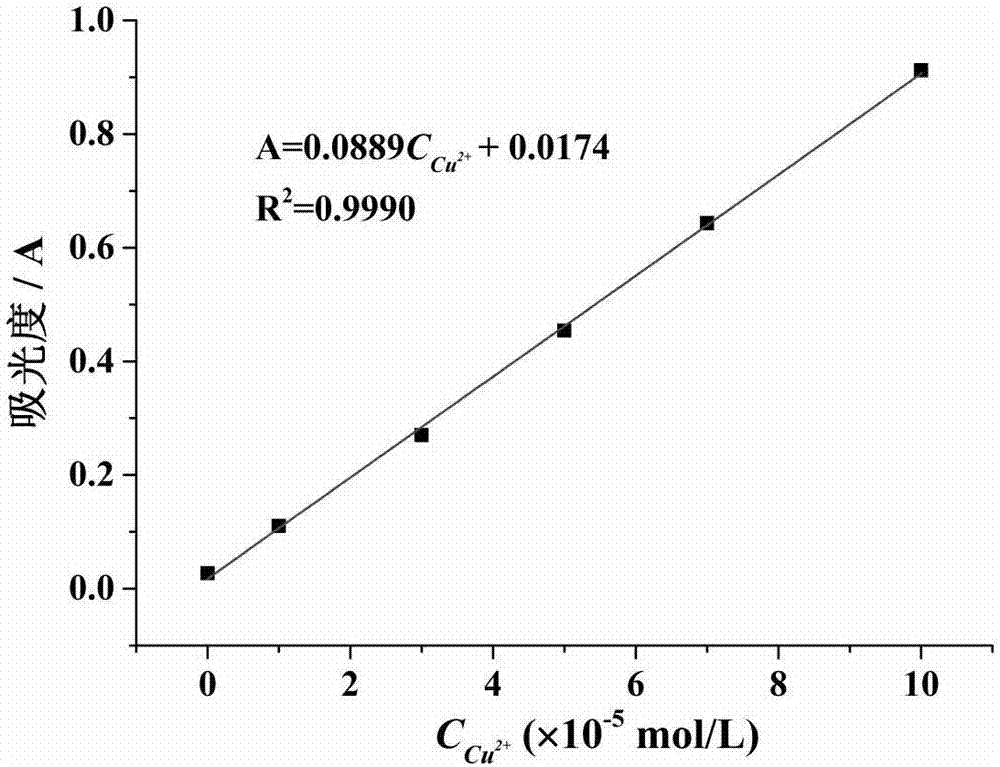Bifunctional material for detecting and adsorbing copper ions as well as synthetic method and application thereof
The technology of a bifunctional material and a synthesis method is applied in the field of copper ion detection, which can solve the problems of difficult recovery, limited adsorption capacity, and increased chemical oxygen consumption in water, and achieves the effect of sensitive selective response and broad industrial application prospects.
- Summary
- Abstract
- Description
- Claims
- Application Information
AI Technical Summary
Problems solved by technology
Method used
Image
Examples
Embodiment 1
[0026] Embodiment 1: Synthetic bifunctional material
[0027] figure 1 It is the chemical reaction route diagram of synthesizing bifunctional material in the present embodiment, as figure 1 As shown, the specific process is as follows:
[0028] (1) Weigh 2.0g sodium alginate (viscosity: 200±20mPa·s) and dissolve it in 98.0g pH5.5 MES (2-(N-morpholine)ethanesulfonic acid) buffer solution, and add 0.15 g 1-ethyl-(3-dimethylaminopropyl) carbodiimide hydrochloride, 0.12g N-hydroxysuccinimide and 3.0g carboxylated chitosan were reacted at 25°C for 6h to prepare get the mixture;
[0029] (2) Under stirring conditions, use a 10mL medical syringe to drop the mixed solution prepared in step (1) into 500mL0.25mol / L calcium nitrate solution drop by drop, continue stirring for 30 minutes after dropping, filter, wash with distilled water, and prepare Obtain calcium alginate-chitosan hydrogel;
[0030] (3) Soak the calcium alginate-chitosan hydrogel prepared in step (2) in distilled wa...
Embodiment 2
[0031] Embodiment 2: Synthetic bifunctional material
[0032] (1) Weigh 2.0g of potassium alginate and dissolve it in 98.0g of MES (2-(N-morpholine)ethanesulfonic acid) buffer solution with pH 5.5, and add 0.15g of 1-ethyl-(3-di Methylaminopropyl) carbodiimide hydrochloride, 0.12g N-hydroxysuccinimide and 3.0g carboxylated chitosan were reacted at 25°C for 6h to obtain a mixed solution;
[0033] (2) Under stirring conditions, use a 10mL medical syringe to drop the mixed solution prepared in step (1) into 500mL0.25mol / L calcium nitrate solution drop by drop, continue stirring for 30 minutes after dropping, filter, wash with distilled water, and prepare Obtain calcium alginate-chitosan hydrogel;
[0034] (3) Soak the calcium alginate-chitosan hydrogel prepared in step (2) in distilled water, place it in a vacuum freeze dryer to freeze, and dry in vacuum to obtain a bifunctional material.
[0035] The difference between Example 2 and Example 1 is that sodium alginate is replace...
Embodiment 3
[0036] Embodiment 3: Synthetic bifunctional material
[0037] (1) Weigh 2.0 g of alginic acid and dissolve it in 98.0 g of MES (2-(N-morpholine) ethanesulfonic acid) buffer solution with pH 5.5, and add 0.15 g of 1-ethyl-(3-dimethyl Aminopropyl) carbodiimide hydrochloride, 0.12g N-hydroxysuccinimide and 3.0g carboxylated chitosan were reacted at 25°C for 6h to obtain a mixed solution;
[0038] (2) Under stirring conditions, use a 10mL medical syringe to drop the mixed solution prepared in step (1) into 500mL0.25mol / L calcium nitrate solution drop by drop, continue stirring for 30 minutes after dropping, filter, wash with distilled water, and prepare Obtain calcium alginate-chitosan hydrogel;
[0039] (3) Soak the calcium alginate-chitosan hydrogel prepared in step (2) in distilled water, place it in a vacuum freeze dryer to freeze, and dry in vacuum to obtain a bifunctional material.
[0040] The difference between Example 3 and Example 1 is that sodium alginate is replaced ...
PUM
 Login to View More
Login to View More Abstract
Description
Claims
Application Information
 Login to View More
Login to View More - R&D
- Intellectual Property
- Life Sciences
- Materials
- Tech Scout
- Unparalleled Data Quality
- Higher Quality Content
- 60% Fewer Hallucinations
Browse by: Latest US Patents, China's latest patents, Technical Efficacy Thesaurus, Application Domain, Technology Topic, Popular Technical Reports.
© 2025 PatSnap. All rights reserved.Legal|Privacy policy|Modern Slavery Act Transparency Statement|Sitemap|About US| Contact US: help@patsnap.com



